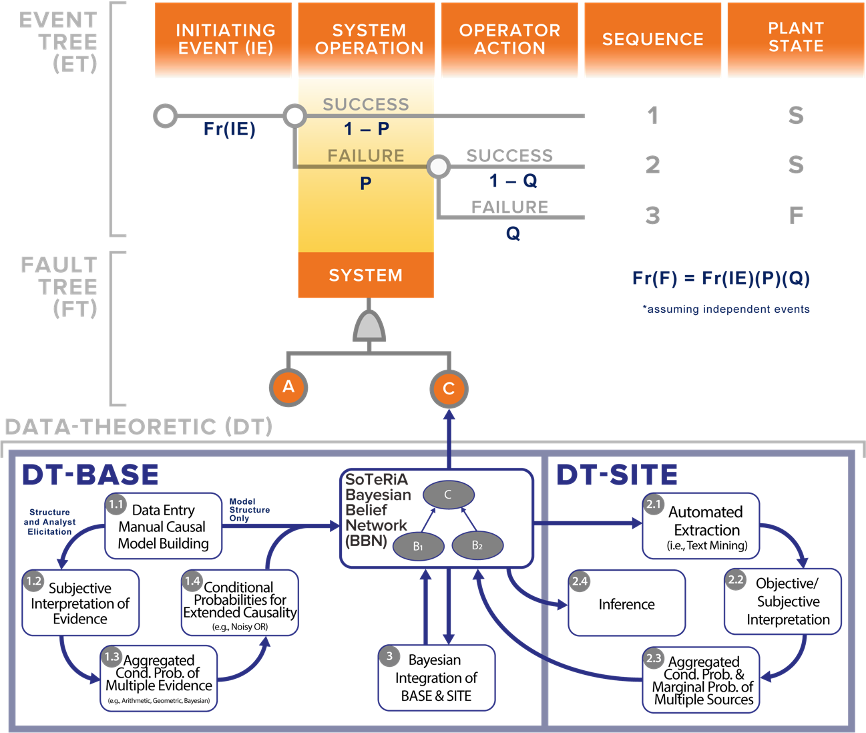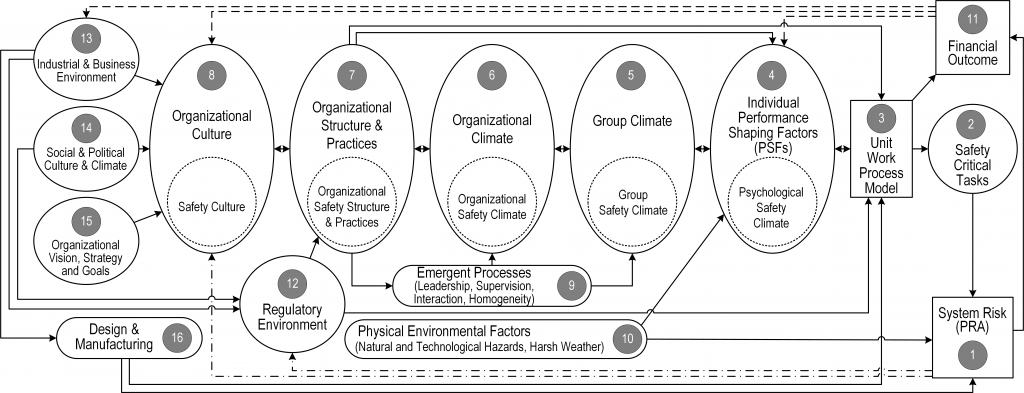NSF Project Description
SoTeRiA Lab Director Zahra Mohaghegh is the Principal Investigator (PI) on a five-year project, entitled “A Big Data-Theoretic Approach to Quantify Organizational Failure Mechanisms in Probabilistic Risk Assessment”, funded by the NSF’s Science of Organizations (SoO) and Big Data Science and Engineering (BIGDATA) programs (See NSF Award Website).
The PI and Director of SoTeRiA lab, an expert in PRA, is joined by experts in Organizational Behavior (Co-PI Cheri Ostroff; University of South Australia), Information Science and Data Analytics (Co-PI Cathy Blake; Graduate School of Library and Information Science, UIUC), and Industry PRA (Senior Personnel Ernie Kee; SoTeRiA Laboratory and NPRE Research Affiliate) to provide answers to these questions: (a) what social and organizational factors affect technical system risk? (b) how and why do these factors influence risk? and (c) how much do they contribute to risk?
The field of PRA has progressed with the quantification of equipment failure and human error for modeling risk of complex systems; however, the current organizational risk contributors lack reliable data analytics. This NSF-funded research fills that gap by developing predictive causal modeling and big-data theoretic technologies for PRA and by expanding the classic approach of data management for risk analysis by utilizing data analytics techniques and simulation to uncover organizational contributors to system risk. In addition to scientific contributions to organizational science, PRA, and data analytics, this research provides regulatory and industry decision-makers with important organizational factors that contribute to risk and leads to optimized decision making. Other applications include real-time monitoring of organizational safety performance indicators, efficient safety auditing, in-depth root cause analysis, and risk-informed emergency preparedness, planning and response. The proposed methodology is applicable for other high-risk industries (e.g., aviation, healthcare, oil and gas).
Fig. 1 The Data-Theoretic Module in the Integrated PRA (I-PRA) Methodological Framework [1, 2]
Additional Description
Organizations produce, process and store a large volume of wide-ranging, unstructured data as a result of business activities and compliance requirements (i.e., corrective action programs, root cause analysis reports, oversight and inspection data, etc.). This research leverages those data resources for the quantification of organizational failure mechanisms and their integration with the technical system risk scenarios generated by PRA. The research is based on a socio-technical risk theory to prevent misleading results from solely data-informed approaches. Combining socio-technical risk theory, systematic modeling and semantic data analytics strategies will greatly enhance risk analysis of complex systems. We will conduct our research based on following steps: (1) Expand factors, sub-factors, and causal relationships in the Socio-Technical Risk Analysis (SoTeRiA) framework, (2) Develop measurement techniques for factors, sub-factors and their causal relationships in SoTeRiA (e.g., integrating text mining with the Bayesian Belief Network; conducting scientific reduction to identify important factors; measuring of important factors), (3) Establish a dynamic, predictive socio-technical causal modeling technique, (4) Perform uncertainty analysis, (5) Conduct verification and validation, (6) Integrate the quantitative socio-technical causal model with PRA, and (7) Conduct sensitivity and importance measure analyses. As the pioneer study on the integration of big data with PRA, this research addresses and quantifies risk emerging from the interface of social and technical systems.
Fig. 2 Socio-Technical Risk Analysis (SoTeRiA) Framework [3]

References
- J. Pence, T. Sakurahara, X. Zhu, Z. Mohaghegh, M. Ertem, C. Ostroff, E. Kee, Data-theoretic methodology and computational platform to quantify organizational factors in socio-technical risk analysis, Reliability Engineering & System Safety, Vol. 185, pp. 240-260, (2019).
- J. Pence, P. Farshadmanesh, J. Kim, C. Blake, Z. Mohaghegh, Data-theoretic approach for socio-technical risk analysis: text mining licensee event reports of U.S. nuclear power plants, Safety Science, Vol. 124, Is. Virtual Special Issue: Safety Analytics (2020)
- Mohaghegh, Z. and A. Mosleh, Incorporating Organizational Factors into Probabilistic Risk Assessment of Complex Socio-Technical Systems: Principles and Theoretical Foundations. Safety Science, 2009. 47(8): p. 1139-1158.

